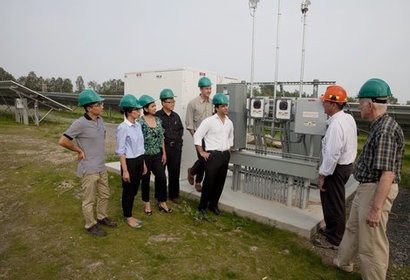
A microgrid is a small electrical grid which relies on locally-generated electricity combined with advanced technology to barricade itself from the larger national grid in the event of an emergency. An additional advantage of microgrids is that they are generally more able to utilise distributed generation resources such as solar power and combined heat and power (CHP). The momentum towards constructing microgrids has been increasing over the last few years, with SolarCity, for example, offering a microgrid service to collaborate with municipalities and universities across the US.
The project team at Clarkson are aiming to develop a “smart scheduler” application as part of the NSF’s Partnership for Innovation: Building Innovation Capacity programme”. The smart scheduler will coordinate with the microgrid operator and the local disaster response team to maximise the microgrid’s performance during the time of disaster recovery.
“The microgrid must operate successfully disconnected from the grid for two weeks or more in catastrophic situations where the level of damage is unanticipated and the microgrid itself has experienced reduced capability” said Tom Ortmeyer, Professor of Electrical & Computer Engineering at Clarkson and the project's principal investigator. “The smart scheduler must become an integral part of the team that responds rapidly and effectively to ever-changing capability and demands.”
Wallace Coulter School of Engineering, School of Business, and School of Arts and Sciences, all based at Clarkson University, are leading the project. The primary industrial partner is National Grid USA, the electric service provider for a large part of New York and New England. The Electric Power Research Institute (EPRI), Knoxville, Tennessee, is the primary R&D collaborator. It will provide assistance with project design, data collection and expert analysis while National Grid will own the underground distribution network that will become the backbone of the microgrid.
Co-principal investigators on the project are Professor of Economics & Financial Studies Mark Frascatore, Assistant Professor of Engineering & Management Cecilia Martinez, Assistant Professor of Electrical & Computer Engineering Jie Li and Associate Professor of Political Science Stephen Bird. Associate Professor of Electrical & Computer Engineering Daqing Hou and Associate Professor of Electrical & Computer Engineering Lei Wu are senior investigators on the project.
Ed White, vice president of National Grid’s New Energy Solutions team said that the grant will go a long way to promote National Grid’s partnership with Clarkson and to provide its customers and the community with a next generation solution to an old dilemma.
“Successfully performing microgrids, such as those in industrial parks, hospitals or Army bases, are critical to large-scale outage restoration after a dramatic event” added Mark McGranaghan, vice president of Power Delivery and Utilization at EPRI. “Microgrids also provide an excellent opportunity to evaluate new technology and test reliability, affordability and efficiency, the core components of an integrated, smart electric grid.”
The project will complement ongoing projects to plan and design a resilient underground microgrid in Potsdam. The Potsdam microgrid features a unique partnership of generator owners, local government, regulated utility, and critical load entities. This diverse set of microgrid partners is key to providing the resilience required of the microgrid.
For additional information:

